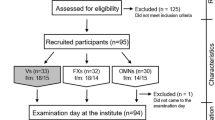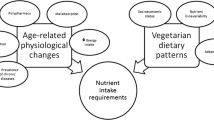Abstract
Purpose
Vegetarian and vegan diets have gained popularity in Switzerland. The nutritional status of individuals who have adopted such diets, however, has not been investigated. The aim of this study was to assess the intake and status of selected vitamins and minerals among vegetarian and vegan adults living in Switzerland.
Methods
Healthy adults [omnivores (OVs), n OV = 100; vegetarians (VGs), n VG = 53; vegans (VNs), n VN = 53] aged 18–50 years were recruited, and their weight and height were measured. Plasma concentrations of the vitamins A, C, E, B1, B2, B6, B12, folic acid, pantothenic acid, niacin, biotin and β-carotene and of the minerals Fe, Mg and Zn and urinary iodine concentration were determined. Dietary intake was assessed using a three-day weighed food record, and questionnaires were issued in order to assess the physical activity and lifestyle of the subjects.
Results
Omnivores had the lowest intake of Mg, vitamin C, vitamin E, niacin and folic acid. Vegans reported low intakes of Ca and a marginal consumption of the vitamins D and B12. The highest prevalence for vitamin and mineral deficiencies in each group was as follows: in the omnivorous group, for folic acid (58 %); in the vegetarian group, for vitamin B6 and niacin (58 and 34 %, respectively); and in the vegan group, for Zn (47 %). Despite negligible dietary vitamin B12 intake in the vegan group, deficiency of this particular vitamin was low in all groups thanks to widespread use of supplements. Prevalence of Fe deficiency was comparable across all diet groups.
Conclusions
Despite substantial differences in intake and deficiency between groups, our results indicate that by consuming a well-balanced diet including supplements or fortified products, all three types of diet can potentially fulfill requirements for vitamin and mineral consumption.
Similar content being viewed by others
References
Walter P et al (2005) Gesundheitliche Vor- und Nachteile einer vegetarischen Ernährung. Bericht der Arbeitsgruppe ‘Vegetarische Ernährung’ der Eidgenössischen Ernährungskommission. Bern, Bundesamt für Gesundheit
BfS. Schweizerische Gesundheitsbefragung (SGB). 2012 (cited 26 November 2014). http://www.bfs.admin.ch/bfs/portal/de/index/infothek/erhebungen__quellen/blank/blank/ess/04.html
Exl-Preysch BM, Mühlemann P (2001) Nutri-Trend-Studie 2000 der Nestlé Suisse SA mit Unterstützung durch das Bundesamt für Gesundheit. Vevey, Bern
Walter P, Baerlocher K (2005) Vegetarismus in der Schweiz. In: Eichholzer M et al (eds) Fünfter Schweizerischer Ernährungsbericht. Bundesamt für Gesundheit, Bern, pp 321–340
Davey G et al (2003) EPIC-Oxford: lifestyle characteristics and nutrient intakes in a cohort of 33883 meat-eaters and 31546 non meat-eaters in the UK. Public Health Nutr 6(3):259–268
Bedford J, Barr S (2005) Diets and selected lifestyle practices of self-defined adult vegetarians from a population-based sample suggest they are more ‘health conscious’. Int J Behav Nutr Phys Act 2:4
Appleby P et al (1999) The Oxford vegetarian study: an overview. Am J Clin Nutr 70(3 Suppl):525S–531S
Spencer E et al (2003) Diet and body mass index in 38,000 EPIC-Oxford meat-eaters, fish-eaters, vegetarians and vegans. Int J Obes 27(6):728–734. doi:10.1038/sj.ijo.0802300
Appleby P, Davey G, Key T (2002) Hypertension and blood pressure among meat eaters, fish eaters, vegetarians and vegans in EPIC-Oxford. Public Health Nutr 5(5):645–654. doi:10.1079/PHN2002332
Fraser G (2009) Vegetarian diets: What do we know of their effects on common chronic diseases? Am J Clin Nutr 89(5):1607S–1612S
Esmaillzadeh A et al (2006) Fruit and vegetable intakes, C-reactive protein, and the metabolic syndrome. Am J Clin Nutr 84:1489–1497
Bui MH et al (1992) Dietary vitamin C intake and concentrations in the body fluids and cells of male smokers and nonsmokers. J Nutr 122(2):312–316
Bui MH (1993) Simple determination of retinol, a-tocopherol and carotinoids (lutein, all-trans-lycopene, a- and b-carotenes) in human plasma by isocrtic liquid chromatography. J Chromatogr B Biomed Sci Appl 654(1):129–133
Bui MH (1999) A microbiological assay on microtitre plates of thiamine in biological fluids and foods. International journal for vitamin and nutrition research. Internationale Zeitschrift fur Vitamin- und Ernahrungsforschung. Journal international de vitaminologie et de nutrition 69(5):362–366
Pino S, Fang S, Braverman L (1996) Ammonium persulfate: a safe alternative oxidizing reagent for measuring urinary iodine. Clin Chem 42(2):239–243
Goldberg G et al (1991) Critical evaluation of energy intake data using fundamental principles of energy physiology: 1. Derivation of cut-off limits to identify under-recording. Eur J Clin Nutr 45(12):569
Bundesamt für Statistik (not dated) Erhebungen, Quellen – Schweizerische Gesundheitsbefragung (SGB). http://www.bfs.admin.ch/bfs/portal/de/index/infothek/erhebungen__quellen/blank/blank/ess/04.html. Accessed 6 July 2011
Janelle K, Barr S (1995) Nutrient intakes and eating behavior see of vegetarian and nonvegetarian women. J Am Diet Assoc 95(2):180–189
Aggett PJ (2012) Iron. In: Erdman JW, Macdonald IA, Zeisel SH (eds) Present knowledge in nutrition. ILSI International Life Sciences Institute, Washington
Li D et al (2000) Selected micronutrient intake and status in men with differing meat intakes, vegetarians and vegans. Asia Pac J Clin Nutr 9(1):18–23
Krajčovičová-Kudláčková M et al (1995) Selected vitamins and trace elements in blood of vegetarians. Ann Nutr Metab 39(6):334–339
Holt RR, Uriu-Adams JY, Keen CL (2012) Zinc. In: Erdman JW, Macdonald IA, Zeisel SH (eds) Present knowledge in nutrition. ILSI International Life Sciences Institute, Washington
Hunt J (2003) Bioavailability of iron, zinc, and other trace minerals from vegetarian diets. Am J Clin Nutr 78(3):633–639
König F et al (2011) Ten repeat collections for urinary iodine from spot samples or 24-hour samples are needed to reliably estimate individual iodine status in women. J Nutr 141(11):2049–2054
Krajčovičová-Kudláčková M et al (2003) Iodine deficiency in vegetarians and vegans. Ann Nutr Metab 47(5):183–185
Remer T, Neubert A, Manz F (1999) Increased risk of iodine deficiency with vegetarian nutrition. Br J Nutr 81:45–50
Haldimann M et al (2005) Iodine content of food groups. J Food Compos Anal 18(6):461–471. doi:10.1016/j.jfca.2004.06.003
Larsson C, Johansson G (2002) Dietary intake and nutritional status of young vegans and omnivores in Sweden. Am J Clin Nutr 76(1):100–106
Institute of Medicine (US) Committee to Review Dietary Reference Intakes for Vitamin D and Calcium (2011) In: Ross AC, Taylor CL, Yaktine AL, Del Valle HB (eds) Dietary reference intakes for Calcium and Vitamin D. National Academies Press, Washington DC, P 1132
Weaver CM (2012) Calcium. In: Erdman JW, Macdonald IA, Zeisel SH (eds) Present knowledge in nutrition. ILSI International Life Sciences Institute, Washington
Federal Food Safety and Veterinary Office (not dated) Schweizerische Nährwertdatenbank. http://www.naehrwertdaten.ch Accessed 14 May 2012
Trumbo P et al (2001) Dietary reference intakes Vitamin A, Vitamin K, Arsenic, Boron, Chromium, Copper, Iodine, Iron, Manganese, Molybdenum, Nickel, Silicon, Vanadium, and Zinc. J Am Diet Assoc 101(3):294–301
Haddad E et al (1999) Dietary intake and biochemical, hematologic, and immune status of vegans compared with nonvegetarians. Am J Clin Nutr 70(3):586S–593S
Biesalski H, Grimm P (2005) Pocket atlas of nutrition, 3rd edn. Georg Thieme Verlag, New York
Krajčovičová-Kudláčková M et al (1996) Lipid and antioxidant blood levels in vegetarians. Food/Nahrung 40(1):17–20
Rauma A, Mykkänen H (2000) Antioxidant status in vegetarians versus omnivores. Nutrition 16(2):111–119
Huang Y et al (2003) The status of plasma homocysteine and related B-vitamins in healthy young vegetarians and nonvegetarians. Eur J Nutr 42(2):84–90
Majchrzak D et al (2006) B-vitamin status and concentrations of homocysteine in Austrian omnivores, vegetarians and vegans. Ann Nutr Metab 50(6):485–491
Herrmann W et al (2003) Vitamin B-12 status, particularly holotranscobalamin II and methylmalonic acid concentrations, and hyperhomocysteinemia in vegetarians. Am J Clin Nutr 78(1):131–136
Watanabe F et al (2013) Biologically active Vitamin B-12 compounds in foods for preventing deficiency among vegetarians and elderly subjects. J Agric Food Chem 61(28):6769–6775. doi:10.1021/Jf401545z
Pawlak R, Lester SE, Babatunde T (2014) The prevalence of cobalamin deficiency among vegetarians assessed by serum vitamin B12: a review of literature. Eur J Clin Nutr 68(5):541–548. doi:10.1038/Ejcn.2014.46
Devalia V et al (2014) Guidelines for the diagnosis and treatment of cobalamin and folate disorders. Br J Haematol 166(4):496–513. doi:10.1111/bjh.12959
Carmel R (2013) Diagnosis and management of clinical and subclinical cobalamin deficiencies: Why controversies persist in the age of sensitive metabolic testing. Biochimie 95(5):1047–1055. doi:10.1016/j.biochi.2013.02.008
Norman AW, Henry HL (2012) Vitamin D. In: Erdman JW, Macdonald IA, Zeisel SH (eds) Present knowledge in nutrition. ILSI International Life Sciences Institute, Washington
FSVO. Vitamin D—the key facts. 2012 (cited 2014 26 November 2014). http://www.blv.admin.ch/themen/04679/05065/05104/index.html?lang=en&download=NHzLpZeg7t,lnp6I0NTU042l2Z6ln1ad1IZn4Z2qZpnO2Yuq2Z6gpJCFfYB9fmym162epYbg2c_JjKbNoKSn6A
Srikumar T, Öckerman P, Åkesson B (1992) Trace element status in vegetarians from Southern India. Nutr Res 12(2):187–198
Rude R (1998) Magnesium deficiency: a cause of heterogenous disease in humans. J Bone Miner Res 13(4):749–758
Fine K et al (1991) Intestinal absorption of magnesium from food and supplements. J Clin Invest 88(2):396
Bohn T (2003) Magnesium absorption in humans. Swiss Federal Institute of Technology, Zurich
Herrmann W et al (2001) Total homocysteine, vitamin B12, and total antioxidant status in vegetarians. Clin Chem 47(6):1094–1101
Herrmann W, Geisel J (2002) Vegetarian lifestyle and monitoring of vitamin B-12 status. Clin Chim Acta 326(1–2):47–59
Key T et al (2009) Cancer incidence in British vegetarians. Br J Cancer 101(1):192–197
Waldmann A et al (2003) Dietary intakes and lifestyle factors of a vegan population in Germany: results from the German vegan study. Eur J Clin Nutr 57(8):947–955
Keller R (2010) Der Tabakkonsum der Schweizer Wohnbevölkerung in den Jahren 2001 bis 2009. Universität Zürich-Psychologisches Institut, Sozial-und Gesundheitspsychologie
IOM (2006) Dietary reference intakes—DRI. Institute of Medicine, Washington
Acknowledgments
We thank all the study participants for their cooperation during the study. Furthermore, we would like to thank Doris Schutz from the Swiss Vitamin Institute for her excellent support during the study and for the vitamin measurements. A big thank you also goes to Stefanie B. Murer, Jasmin Tajeri Foman, Sara Stinca, Valeria Galetti and Christophe Zeder at the Human Nutrition Laboratory at ETH Zurich for their support during the study, for help with translations, sample organization and laboratory analyses. For financial support, we would like to thank the Swiss Foundation for Nutrition Research (SFEFS) and the Swiss Vitamin Institute.
Author information
Authors and Affiliations
Corresponding author
Ethics declarations
Conflict of interest
None of the authors have any conflict of interest regarding this work.
Rights and permissions
About this article
Cite this article
Schüpbach, R., Wegmüller, R., Berguerand, C. et al. Micronutrient status and intake in omnivores, vegetarians and vegans in Switzerland. Eur J Nutr 56, 283–293 (2017). https://doi.org/10.1007/s00394-015-1079-7
Received:
Accepted:
Published:
Issue Date:
DOI: https://doi.org/10.1007/s00394-015-1079-7




